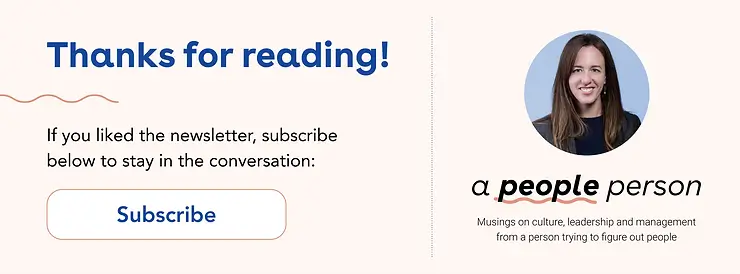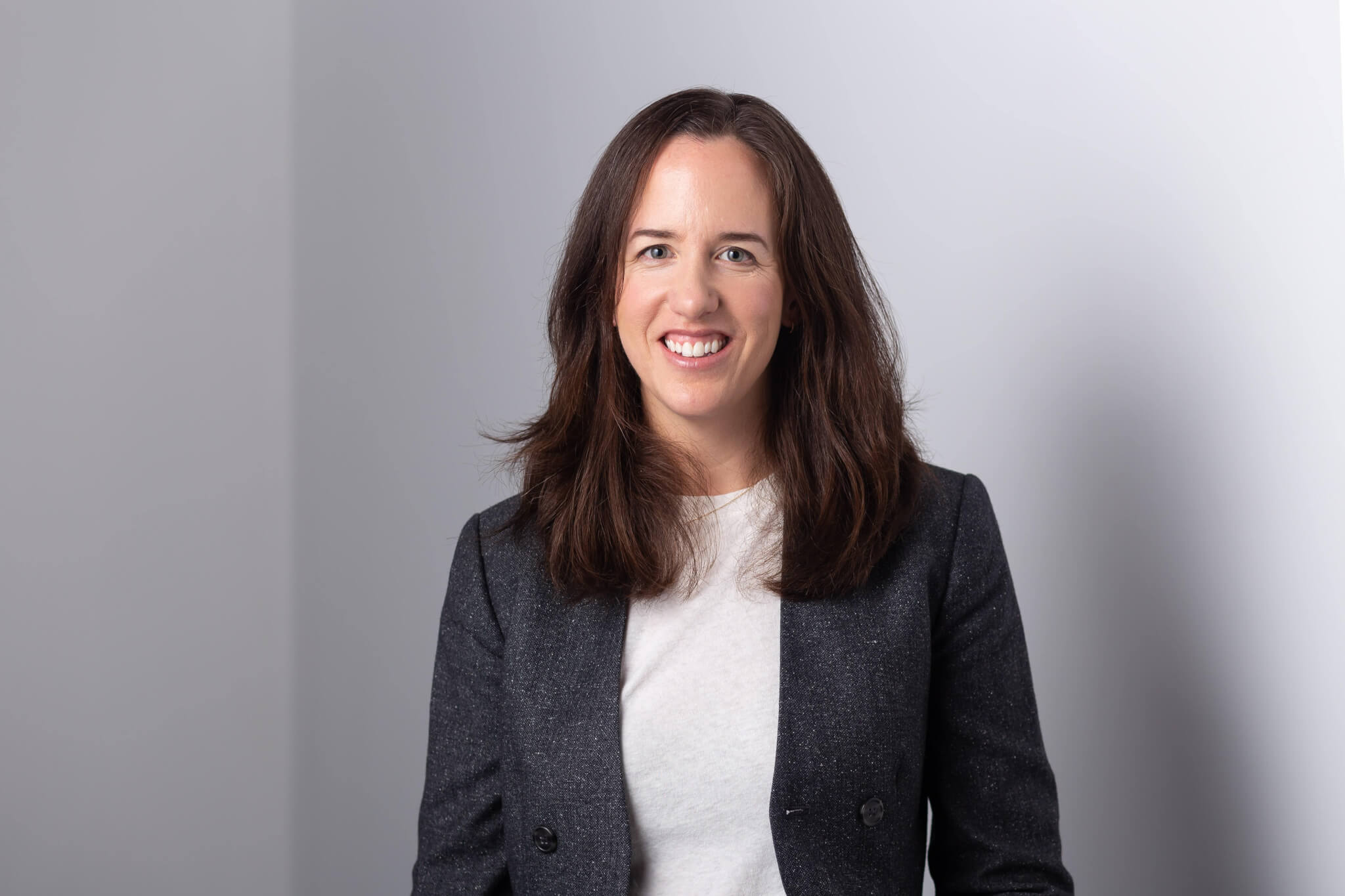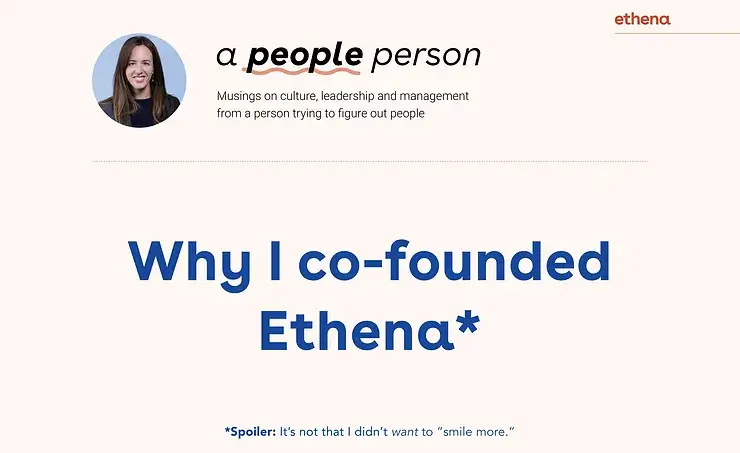Hi there,
When I first started Ethena, people would ask why I was starting a company that made effective, versus check-the-box, sexual harassment prevention training. It’s a pretty specific idea.
I’d reply with some version of, “I was a woman in the Army and my co-founder is a woman software engineer. We know the problem.”
We’ve spent our careers in male-dominated spaces.
In the Army, I saw clear, egregious examples of harassment: bosses making drunken advances, men standing in front of a formation and saying that women don’t belong. I once woke up at night, in the women’s barracks, with a man standing over the cot next to me. This was the culture. No one asked if we were okay. We just got a padlock.
But then there was (and I don’t love this phrase but I don’t have a better one) the small stuff. All the seemingly little things that didn’t even have a common term at the time—things like gendered feedback, microaggressions, and a general “if you don’t like it, leave” attitude.
GENDERED LANGUAGE
AMA, really
Today, I’m the CEO and co-founder of Ethena, a company that started by offering a research-backed approach to sexual harassment prevention training and has since grown into a compliance training platform.
Last week, I was doing an internal company Ask Me Anything (AMA) and a new team member sensitively asked if there was any specific story that drove me to found Ethena.
There is, and because it’s my three year anniversary of co-founding the company, now seems like as good a time as any to share it.
*Note: I changed the names for many reasons. This is about a system, not individuals, and this is my memory, with all the complexity that entails.
Smile more
Between leaving the Army and co-founding Ethena, I worked at a consulting firm. I had a great experience—learned a lot, worked with good people, and got a foothold in the private sector. But it is a workplace, and like all workplaces, it had its issues.
I was a junior team member on a consulting team. It included my immediate boss, who I’ll call James.* He was a fellow veteran and a good guy. The more senior boss of the team was a partner I’ll call Chad.*
I started working with this small team, and it became clear, pretty quickly, that Chad had some dated, problematic thoughts. It was a million seemingly “small” things: comments, looks, who he talked to and who he ignored.
I remember one day he emailed out this New York Times article, which you should read. It’s the obituary of a woman soldier who was killed.
Except Chad only emailed the article to James, saying something like, “powerful article about what it means to serve.” James and I both served, but whenever Chad (who didn’t serve) talked about the military, he’d only talk to James.
“Must have been tough jumping out of planes,” he’d say to James, and then usually James would try to include me in his response. “Yeah, Roxanne and I thought it sucked,” or whatever.
So it bothered me that even with an article about a woman service member, Chad still couldn’t remember that I also served. Or he didn’t care. James cc’d me on his reply to Chad.
It’s small, right? Maybe he thought he did add me on the email. But this sort of thing happens all the time. And I get it: most vets are men.
But a good boss should learn and incorporate their team’s experiences relatively equally. Chad asked all sorts of questions about James’s military service. Never brought up mine.
Then, one day we’re in a meeting with clients and I got an email from Chad that included the phrase, “smile more” I guess he thought I didn’t look friendly in the meeting.
It hit harder than I would have expected. My job was a consultant. Not a model, cheerleader or other role where my smile is relevant to my performance. Yet over the course of my career, I’ve felt an expectation to be friendly and approachable, expectations we don’t generally put on male leaders.
Later that day, James and I were driving to LaGuardia Airport (probably didn’t help my mood). I remember picking out a snack at the airport and telling James how frustrated I was. I’d felt ignored and talked over; I’d heard Chad condescendingly speak to another woman on a study for weeks. And now, “smile more”
James turned to me and said something like, I can tell that you’re pissed, but I don’t really understand why.
It finally hit me: James didn’t know about gendered language, the context of all the “small” slights that came before it, and the weight of the phrase “smile more” for women in the workplace.
Over the course of his career, James must have sat through 20+ hours of sexual harassment prevention training. But that training focused on the most egregious manifestations of harassment. Think black and white extremes. Don’t do this. Don’t say that. That’s obviously important, but it’s also not enough.
His training wasn’t comprehensive or nuanced, and didn’t cover some of the more subtle conduct, the stuff that most of us see far more frequently than the egregious scenarios.
The standard training James—and all of us—received taught us the floor: the things we couldn’t/shouldn’t do. It didn’t teach us the ceiling—how to reach for inclusion. How to build a team where we could all do our best work. And how to operate daily life in the workplace that is filled with hundreds of “gray area” scenarios.
Three years strong
I started Ethena shortly after this experience because I’d worked in a world of James’s, good people wanting to do right. But I’d only ever sat in training designed for the guy who walked into a women’s barrack at night and needed to be told not to.
I wanted to help build a training experience that ventured into the gray, respected learners’ time, actually changed behaviors, and aimed for building better workplaces. One that doesn’t just check a box.
And I’m really happy to be celebrating three years doing exactly that. You might say, I smile more now.
Now that you know the origin story, if you’d like to learn more about Ethena, dive into our company mission page to see our foundational values. We’ve had the privilege of training over 70,000 learners at innovative companies wanting more than just a box-check.
Until next time,
Roxanne Petraeus CEO & Co-founder, Ethena










